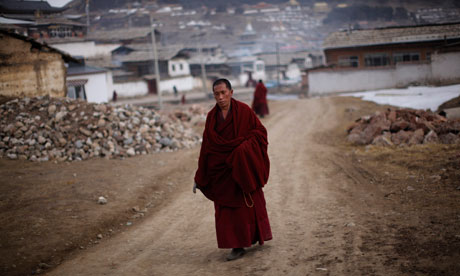By: Jessica Ties
Impunity Watch Reporter, Asia
BEIJING, China – On March 5, 2012 the National People’s Congress approved a measure to boost spending on domestic security by 11.5 percent bringing the total budget to 111.4 billion U.S. dollars.

Chinese Premier Wen Jiabao pledged that the increase in spending would be used to pursue modernization and expansion of the Chinese law enforcement agencies including the People’s Armed Police which is responsible for controlling domestic riots.
The approval of increased spending has caused some to fear that the “stability maintenance” measures undertaken this year ahead of leadership transition could become a permanent program.
In his annual address, Wen stated that the most important task for the Chinese military “…is to win local wars under information-age conditions.”
The statement was likely prompted by the Chinese government’s recent experiences with domestic unrest, including a string of twenty-five self-immolations that have occurred in the past year.
In addition, approximately one-hundred petitioners were detained earlier this week after traveling to Beijing to express their grievances with Chinese authorities.
Those detained were taken to unofficial detention centers known as “black jails” where detainees are often held until they can be taken back to their home town by local officials.
Other activists complained that after attempting to deliver petitioning letters to the National People’s Congress building, they were taken by police and told that such activity was illegal.
In addition to concerns about the affect of increased domestic security spending on dissidents, some have expressed frustration that the money is not being used to provide other services.
The new budget for domestic security, for the second consecutive year, exceeds the 106.4 billion dollar budget implemented for national defense.
This statistic prompted Liu Kaiming, head of the Local Social observation Research Institute, to state that the “…cost of maintaining public security is greater than the defense of the country…this shows that our society is actually very unstable, if so much has to be spent on maintaining stability.”
Liu continued to also express his belief that the Chinese government is not expending a sufficient amount of its resources on social security, health insurance or education.
In 2010 the number of unrest recorded by the Chinese government was approximately 90,000 illustrating a growth from the 8,700 incidents recorded in 1993.
Although data about the number of protests in China has not been released since 2010, an economist and senior adviser to the State Council, Niu Wenyuan, stated that there is an average of 500 protests each day equating to 180,000 per year.
Some have expressed that the exceedingly high number of protests facing China should be seen as an illustration of structural flaws present in the Chinese government.
For more information, please see:
Vancouver Sun – China Fears Unrest at Home More Than Foreign War – 7 March 2012
Merco Press – China Boosts Domestic Security Budget to Face Growing Unrest – 6 March 2012
Radio Free Asia – China Boosts Domestic Security Forces – 6 March 2012
Reuters – China Domestic Security Spending Rises to $111 Billion – 5 March 2012



